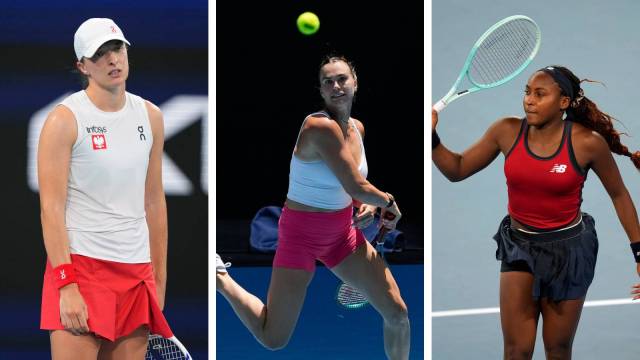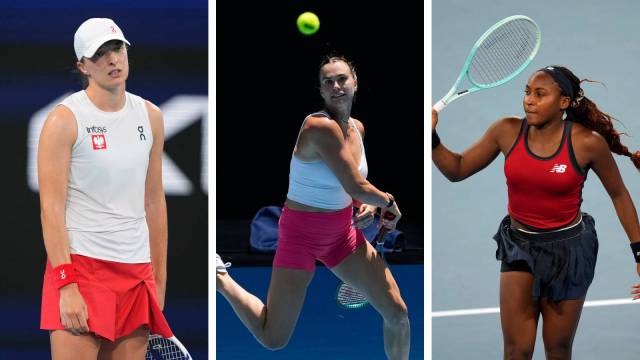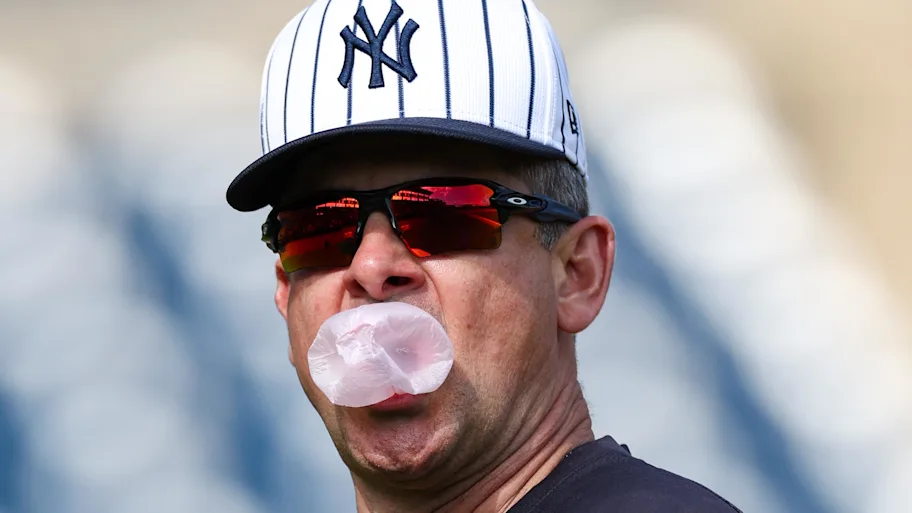
A day after he had won the Cincinnati Masters title, news dropped of Jannik Sinner’s failed dope tests and suspicions swirled regarding his immediate exoneration. Despite the enormous media interest and raised eyebrows from peers in the locker room, a few weeks later he won the US Open and ended the year as World No. 1 after one of the most successful ATP seasons.
A similar task lies ahead for Iga Swiatek, the women’s World No. 2 and five-time Major winner, who arrives at the Australian Open, starting Sunday, for her first major event since being banned for one month for testing positive for the banned substance trimetazidine, which she, like Sinner, successfully appealed was a case of accidental contamination with her sleeping medication.
With a different personality and coming into the year in patchy form, Swiatek, who has not always been immune to tempestuousness, must find the resolve that Sinner found to block out the noise behind her and succeed on the big stage in what will be the most daunting challenge of the Polish 23-year-old’s career so far.
Already facing accusations of a lack of transparency and favouritism regarding anti-doping controls, Swiatek’s case heightened the scrutiny for tennis’s governing bodies even more. In November, it was announced that Swiatek had accepted the month-long ban — essentially a plea bargain — retroactively between September and October, meaning her absences from tournaments in that time for ‘fatigue’ and ‘personal matters’ were really due to a doping violation that had been concealed from the public.
Sceptics of the system, having already raised concerns during the Sinner case, spoke out against what seemed like another case of preferential treatment, when lower-ranked players have had year-long bans despite testing positive due to accidental contamination.
Swiatek believes herself to be fortunate to avoiding becoming one of the symbols of her fellow colleagues’ mistrust of the system.
“For sure, it wasn’t easy; it was probably, like, the worst time in my life,” she was quoted as saying at the pre-tournament press conference by Reuters.
“I always worked hard to be a good example, to show my integrity, show good behaviour. Having no control over this case really freaked me out a bit,” the Pole said. “But in the locker room, the girls are great… They’re worried this can happen to them, as well. There are many top players that are supportive. I appreciate that, because it made me feel better when I came back and didn’t know how it was going to be.”
But the scale of negative attention, for a player that travels with a psychologist in acknowledgement of the need for mental steadiness during the testing grind of Grand Slam tennis, will prove to be a huge mental hurdle.
Swiatek’s dominance on the tour between 2022-23 faded last year; her performances away from her favoured surface slumped, the competition caught up, and she lost her grip on the top spot of the rankings after having already spent 125 weeks as World No. 1 (seventh-most in WTA history).
Even before the doping setback, she had acknowledged the need for technical changes — in particular in the way in which power-hitters test her game on hard courts by rushing her groundstrokes, testing her extreme western grip. A new coach, Wim Fissette, who previously worked with Naomi Osaka, has been hired too.
After a couple of brutal assignments in recent tournaments, the draw has been kind to the second seed in Melbourne. No sleeping giants lay lurking in her path to the second week. But as has been the case before, and now more than ever, the challenge for Swiatek may be within as opposed to who is on the other side of the net.
World No. 1 Aryna Sabalenka and third seed Coco Gauff, the best hard court players of the past two years and the form players on tour, start as favourites, with a potential semifinal encounter on the cards.
After struggling through most of 2024, Gauff turned things around after she left coach Brad Gilbert at the end of the season and began working on more technical issues. Titles at the WTA Finals and United Cup have worked as perfect preparation.
If the Novak Djokovic-Andy Murray partnership is the one making headlines, the coaches merry-go-round in the women’s section is likely to create plenty of intrigue.
Swiatek has roped in Fissette, while Osaka has replaced him with Serena Williams’s former coach Patrick Mouratoglou.
Now ranked 50th, Osaka has shown signs of a spark since her post-pregnancy return to the game, but a big comeback awaits. A sleeping giant in the draw after a run to the final in Auckland this week, but she will have to do it the hard way with plenty of top names and form players in her section.
Meanwhile, Djokovic’s former coach Goran Ivanisevic has been hired by sixth seed Elena Rybakina. The Kazakh, a former Wimbledon champion and finalist at Melbourne in 2023, has flown under the radar after illnesses and injuries have taken their toll, but the big-serving steady baseliner makes for a good match with Ivanisevic, and, in Swiatek’s half, the sixth seed could do some damage.
If she can keep the distractions away, that is. Rybakina has announced the return of her former coach, Stefano Vukov, only for the WTA to reveal that he is unavailable due to an ongoing investigation into a breach of code of conduct.



